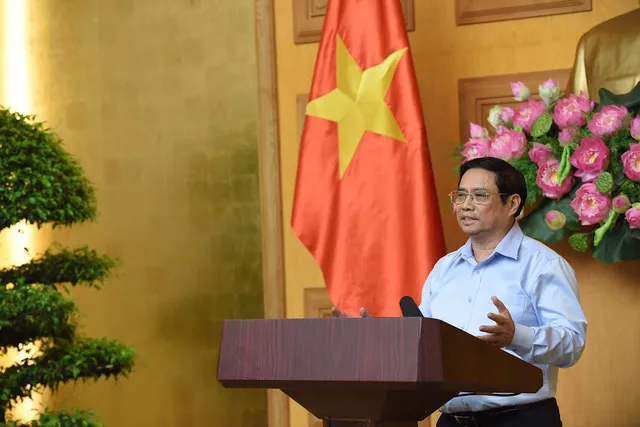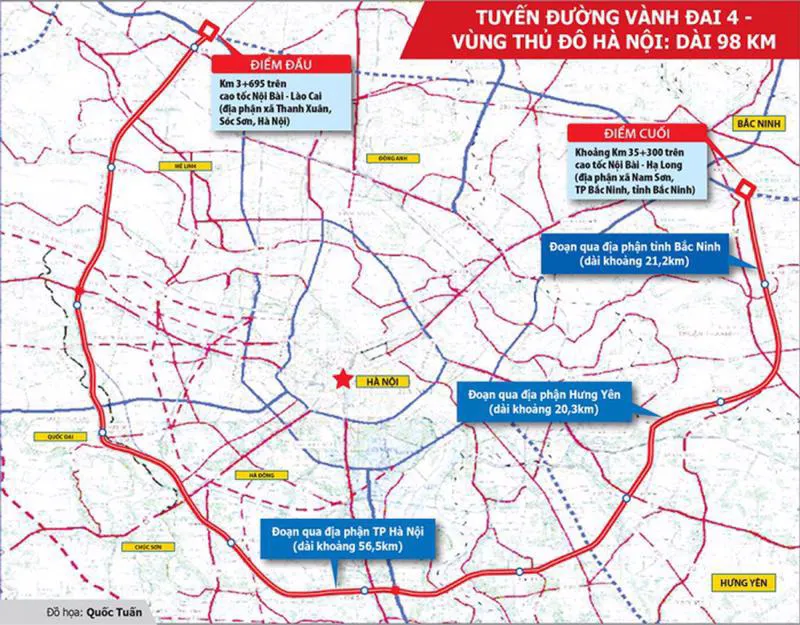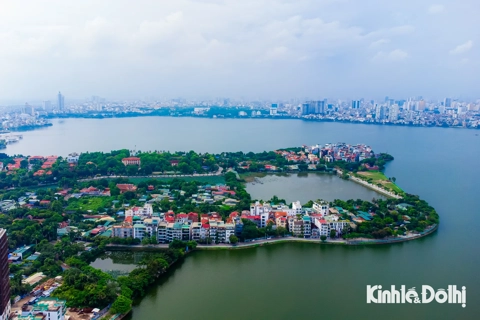Construction of Hanoi’s Ring-road No.4 set to begin next June
Ring-road No.4, one of the nine projects of national priority, is expected to create driving forces for Vietnam’s socio-economic recovery.
The construction of Ring-road No.4 in Hanoi and neighboring cities under the capital area is scheduled to begin in June 2023.
| Prime Minister Pham Minh Chinh at the meeting. Photos: Nhat Bac |
“The Hanoi’s authorities and related provinces/cities should focus on completing investment procedures for sub-component projects and activities related to site clearance before the timeline.”
Minister of Transport (MoT) Nguyen Van The stressed the goal during a meeting of the National Steering Committee on priority projects on August 10.
This was the first meeting of the Committee after its establishment on July 23, which focuses on nine major transport projects worth a combined VND734 trillion (US$31.4 billion), including the Ho Chi Minh road; expressway sections Easter North-South, Ben Luc – Long Thanh, Khanh Hoa – Buon Me Thuot, Bien Hoa – Vung Tau, Chau Doc – Cantho – Soc Trang, Ring road No.4 in the capital area, Ring road No.3 in Ho Chi Minh City; express railway North-South; metro lines in Hanoi and Ho Chi Minh City; Long Thanh International Airport.
According to The, the MoT targets to complete four component projects of the Eastern North-South expressway (sections Mai Son – Highway No.45, Cam Lo – La Son, Vinh Hao – Phan Thiet, and Phan Thiet – Dau Giay) in 2022, finish the contractor selection process and other procedures for the remaining sub-components by late 2022.
Ring-road No.4 (Red line), which is designed to run through the Hanoi Capital Zone, begins in Soc Son District in the northern part of Hanoi and ends in the northern city of Bac Ninh. Photo: The Hanoi Times |
In addition, the pre-feasibility study of the North-South express railway should be completed and submitted to the National Assembly for approval, while the construction of the Ho Chi Minh road is set to start in 2025.
Other expressway sections of Khanh Hoa – Buon Me Thuot, Bien Hoa – Vung Tau, Chau Doc – Cantho – Soc Trang, should start construction before June 30, 2023.
At the meeting, Deputy Prime Minister Le Van Thanh noted the execution of these projects is in favorable conditions, thanks to the huge state budget under disposal, or a four-fold increase against the previous Government’s term.
“Cities/provinces under the project areas are set to have huge room for development once they are completed,” Thanh said, calling for greater responsibilities among localities in accelerating project preparation phases, especially in the contractor selection and site clearance.
Prime Minister Pham Minh Chinh noted infrastructure development, legal institution and human resource are three breakthroughs for Vietnam’s long-term development.
By 2030, Chinh expected the country to have at least 5,000 kilometers of expressway, quadruple over 1,100 kilometers built during the 2000-2021 period.
Chinh stressed the significance of implementing projects of national priority, which would create new driving forces for development across provinces/cities in the country, especially in laying the foundation for the establishment of new industrial parks, residential areas, or service establishments; the promotion of economic activities and job creation for locals, and support socio-economic recovery.
Ring road No.4 with a total length of 112.8 kilometers and covering a combined area of 1,341 hectares, would run through Hanoi (58.2 kilometers), Hung Yen (19.3 kilometers), and Bac Ninh (25.6 kilometers). Once completed, the project is expected to bolster provincial connectivity between Hanoi and the northern provinces in the capital area. The total investment cost of the project is VND85.8 trillion ($3.7 billion), with VND41.8 trillion ($1.8 billion) for the 2021-2025 period sourced from the state budget. Of the total, Hanoi would contribute VND22.47 trillion ($967.2 million) from its local budget, Hung Yen VND1 trillion ($43 million), and Bac Ninh VND2 trillion ($86 million). In the subsequent five years, the project funding would continue to be allocated VND14.5 trillion ($624.2 million), with Hanoi contributing VND4 trillion ($172 million), Hung Yen VND505 billion ($21.7 million), and Bac Ninh VND1.16 trillion ($50 million). The private sector, meanwhile, is expected to fund VND29.4 trillion ($1.26 billion). |














